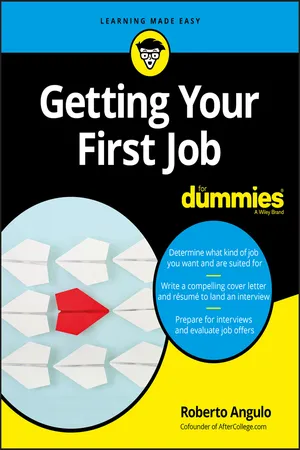
- English
- ePUB (mobile friendly)
- Available on iOS & Android
Getting Your First Job For Dummies
About this book
Find—and land—your first job!
Finding a job can seem daunting, especially when it's a brand new experience. There's a lot to know, and often a lot of pressure. Written by the founder of AfterCollege.com, Getting Your First Job For Dummies is designed to take the stress out of the job search process and help you get an offer.
In this book, you'll discover how to identify your talents and strengths, use your network to your advantage, interview with confidence, and evaluate an offer. Written in plain English and packed with step-by-step instructions, it'll have you writing customized resumes, conducting company research, and utilizing online job search sites, faster than you can say 'I got the job!'
- Determine what kind of job suits your interests and skills
- Write a compelling cover letter
- Know what to expect in an interview
- Effectively negotiate an offer
Whether you're still in school or navigating the world as a recent graduate, Getting Your First Job For Dummies arms you with the skills and confidence to make getting your first job an exciting and enjoyable process.
Tools to learn more effectively

Saving Books

Keyword Search

Annotating Text

Listen to it instead
Information
Preparing Yourself Before the Job Search
Mapping Out Your Job Search Strategy



Getting Your First Part-Time Job
- Money: This is the obvious benefit. Unless you’re volunteering for a nonprofit, you need to get paid for your time and effort. A part-time job gives you spending money.
- Flexibility: This is one of the key benefits, especially if you’re in school or have other obligations. While you’re in school, your focus should be on your education and not so much on work. A part-time job gives you the flexibility to earn money on a schedule that fits around your classes.
- Work ethic: This is often an understated benefit, but your first job is also the way you learn about the value of working hard and working with others. A job also forces you to be on time and teaches you to deliver on your commitments. Future employers will infer you have these qualities when they see your work experience.
Securing Internships
- Gain experience. They give you relevant knowledge in a field or industry. This helps convince employers down the line that you have relevant knowledge, improving your chances of getting a great first job.
- Try before you buy. Hopefully you have great internships and value the experience you gain. But if you don’t have a good experience, this is still okay. An internship lets you figure out what an employer is like or what an entire industry is about. It gives you a reality check so you can make sure you want to pursue the path you’ve put yourself on. If you like the employer and the industry, you can keep moving forward with confidence. If not, then you have time to consider a different path and different employers before you graduate.
- Get your foot in the door. Some employers also like to try before they buy. They invest time and resources into creating internship programs that serve as pipelines to hire new college graduates. Often, an internship can serve as your ticket to a full-time job after you graduate. So, if you have a company you really want to work for, focus on getting an internship there.
- Make contacts. A good internship allows you to develop professional relationships with fellow interns and with the employer. If you do a good job and like the employer, you may get invited to apply for a full-time job upon graduation. You may also make contacts who can recruit you into other organization...
Table of contents
- Cover
- Title Page
- Table of Contents
- Introduction
- Part 1: Preparing Yourself Before the Job Search
- Part 2: Starting Your Job Search
- Part 3: Navigating the Application Process
- Part 4: Acing the Interview and Getting the Offer You Want
- Part 5: Starting Your First Job
- Part 6: The Part of Tens
- About the Author
- Advertisement Page
- Connect with Dummies
- End User License Agreement
Frequently asked questions
- Essential is ideal for learners and professionals who enjoy exploring a wide range of subjects. Access the Essential Library with 800,000+ trusted titles and best-sellers across business, personal growth, and the humanities. Includes unlimited reading time and Standard Read Aloud voice.
- Complete: Perfect for advanced learners and researchers needing full, unrestricted access. Unlock 1.4M+ books across hundreds of subjects, including academic and specialized titles. The Complete Plan also includes advanced features like Premium Read Aloud and Research Assistant.
Please note we cannot support devices running on iOS 13 and Android 7 or earlier. Learn more about using the app

